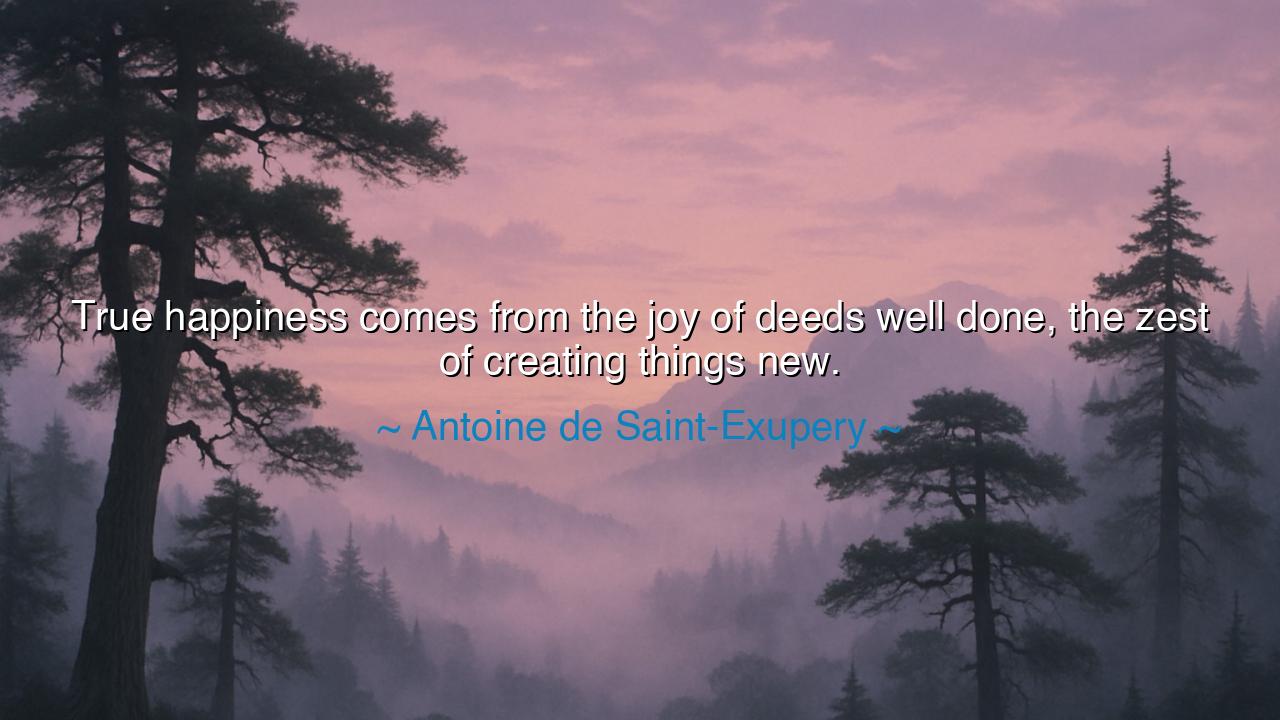
True happiness comes from the joy of deeds well done, the zest of






The aviator and philosopher Antoine de Saint-Exupéry, whose soul soared as high as the planes he flew, once wrote: “True happiness comes from the joy of deeds well done, the zest of creating things new.” These words, drawn from the heart of a man who lived between the clouds and the stars, are not merely a reflection on joy—they are a map to a meaningful life. In them lies the ancient wisdom that happiness is not found in ease or pleasure, but in purpose, in creation, and in the quiet satisfaction of having given your best to the world.
Saint-Exupéry was no idle dreamer. He was a pilot who braved the endless skies in the early days of flight, when each journey could end in disaster. He wrote these words not from comfort, but from the edge of existence—from the solitude of the desert, the silence of the night sky, and the peril of the unknown. He had discovered through hardship what many seek in vain through luxury: that true happiness is the fruit of effort and creation. It comes when one’s hands, mind, and spirit work together in harmony, when one’s deeds are not half-hearted, but well done, glowing with the fire of integrity.
In the modern world, many chase happiness as though it were a treasure buried somewhere outside themselves. They seek it in possessions, applause, or the fleeting thrill of comfort. But Saint-Exupéry’s words remind us that happiness cannot be purchased—it must be earned. It blooms naturally when one’s heart is aligned with one’s actions, when one’s days are filled not with idle longing but with zest, that sacred enthusiasm for building, discovering, and bringing something new into being. The one who creates, whether through art, service, invention, or kindness, drinks from the purest well of joy.
The ancients knew this truth well. In the great myths, creation was the act by which the divine expressed love for the world. The gods shaped mountains, oceans, and stars—not for reward, but for the zest of creating. So too are we, their descendants, called to be creators in our own right. Every noble act, every invention, every work of beauty or compassion adds to the tapestry of existence. When we give ourselves fully to the work of creation—be it building a home, healing another, writing a poem, or nurturing a child—we awaken the divine spark within us, and happiness flows not as a goal, but as a by-product of purpose fulfilled.
Consider the life of Florence Nightingale, who walked into the filth and horror of wartime hospitals during the Crimean War. She did not seek comfort or recognition; she sought only to serve, to heal, to do what was right. The deeds well done—the care she gave, the reforms she fought for, the countless lives she saved—became her source of light. Her happiness was not one of ease, but of meaning. It was born not from what she possessed, but from what she created: a legacy of compassion that reshaped the world. Her story is the living echo of Saint-Exupéry’s wisdom—that joy is found in creation, not consumption; in giving, not grasping.
To live this teaching is to embrace effort with love. It is to take pride not in the prize, but in the process. When you rise in the morning and give your heart to your labor—whether humble or grand—you participate in the sacred act of creation. When you finish your day knowing you have done your work well, no matter how small, you have touched that quiet joy Saint-Exupéry spoke of—the joy that no wealth or fame can equal. For the heart that works with integrity and passion is already full; it needs no external crown.
So, my children, remember this eternal truth: happiness is not found in waiting for joy, but in doing joy. Deeds well done are the true songs of the spirit, and creation is the dance of the soul with the divine. Do not fear work; make it sacred. Do not dread struggle; let it forge your meaning. Pour yourself into the things you build, and you will find that joy rises naturally, like dawn after darkness.
And when you grow weary, recall the voice of Saint-Exupéry whispering through the wind: “True happiness comes from the joy of deeds well done, the zest of creating things new.” Let these words be your compass. Live bravely, work nobly, and create joyfully—for in doing so, you will not only find happiness, but you will become its source, radiating light to all who cross your path.






AAdministratorAdministrator
Welcome, honored guests. Please leave a comment, we will respond soon